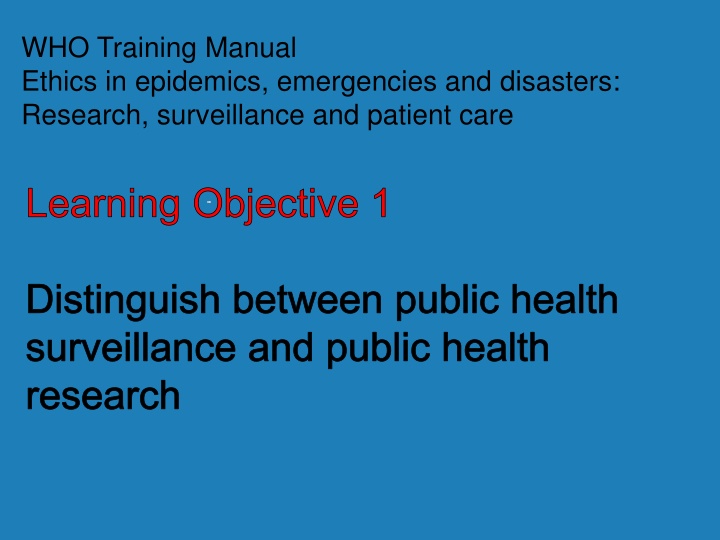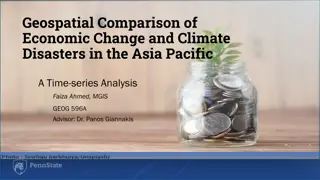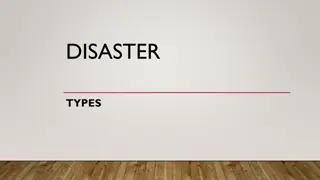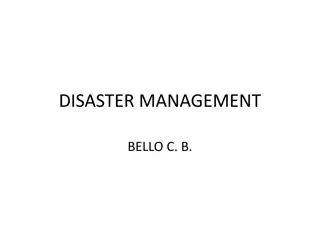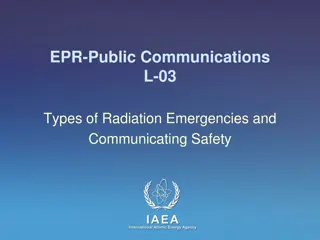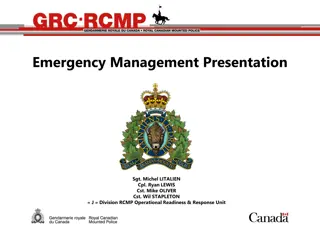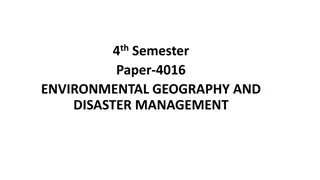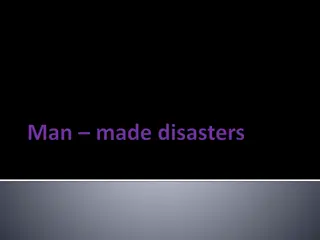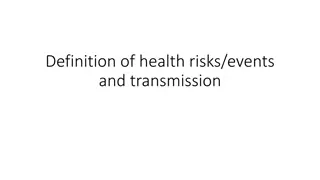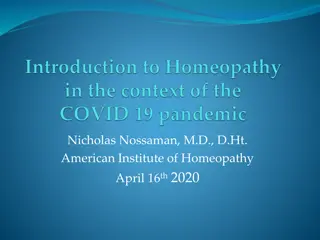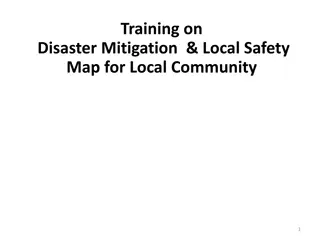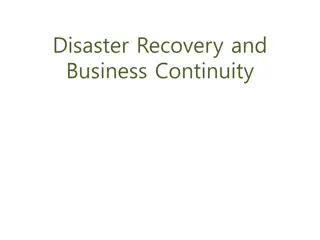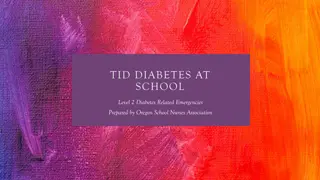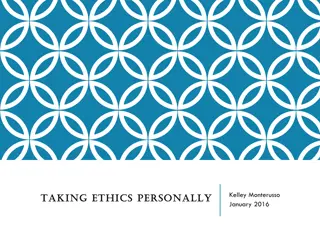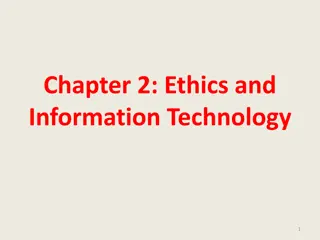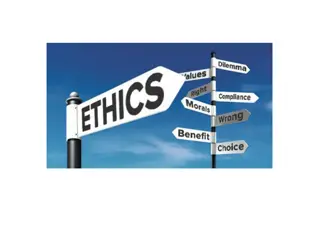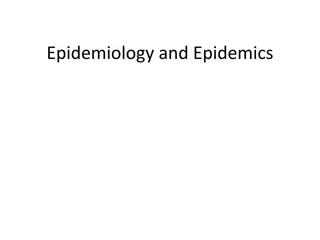Ethics in Epidemics, Emergencies, and Disasters: Distinguishing Research vs Surveillance
This training manual by WHO explores the ethical considerations between public health surveillance and research in epidemics and emergencies. It delves into the similarities and differences, highlighting the importance of ethical standards in both areas.
Download Presentation

Please find below an Image/Link to download the presentation.
The content on the website is provided AS IS for your information and personal use only. It may not be sold, licensed, or shared on other websites without obtaining consent from the author.If you encounter any issues during the download, it is possible that the publisher has removed the file from their server.
You are allowed to download the files provided on this website for personal or commercial use, subject to the condition that they are used lawfully. All files are the property of their respective owners.
The content on the website is provided AS IS for your information and personal use only. It may not be sold, licensed, or shared on other websites without obtaining consent from the author.
E N D
Presentation Transcript
WHO Training Manual Ethics in epidemics, emergencies and disasters: Research, surveillance and patient care Learning Objective 1 Distinguish between public health surveillance and public health research
Outline 1. Introduction and group discussion research and surveillance ethics 2. Reading of the scenarios 3. Team preparation 4. Team presentations and discussion 5. Summary and wrap up Suggested time 0-15 (15 min) 15-20 (5 min) 20-40 (20 min) 40-55 (15 min) 56-60 (5 min) Activity Summary conclusion Introduction Reading Team preparation Team presentations and discussion L.O. 1.1
Introduction - Research Ethics One of the most developed areas of bioethics, and an area that bioethics largely grew out of to become an autonomous discipline A large body of literature exists Academic/theoretical literature Principles and Guideline documents Much takes place in practice Oversight mechanisms (e.g., research ethics committee review) L.O. 1.1
Introduction Surveillance ethics Surveillance is similar to research in many ways: Both can involve similar methodologies/activities (e.g., systematic investigation, medical record review, data mining) Both involve human subjects Both can raise similar ethical issues, including: exposure of subjects to risk, standards of care, questions about informed consent L.O. 1.1
Introduction Surveillance ethics Increasing importance of surveillance (ethics): Greater role attributed to surveillance in revised WHO International Health Regulations (2005) Rapid technological advance (in diagnostics and other relevant technologies) L.O. 1.1
Surveillance vs Research Surveillance is treated different (than research) in practice: Lack of similar standard/international regulations But (why) should this be the case? Less institutional oversight Committee review often not sought/required But (why) should this be the case? Same ethical principles not (always) followed E.g., informed consent is basic tenet of research ethics, but informed consent is often not sought in context of surveillance But (why) should this be the case? L.O. 1.1
Question What is the technical distinction between research and public health practice (e.g. surveillance that is non-research)? L.O. 1.1
Standard Definitions Research: a systematic investigation ... designed to develop or contribute to generalizable knowledge US Federal Policy for Protection of Human Subjects: http://www.hhs.gov/ohrp/humansubjects/guidance/45cfr46.html#46.102 L.O. 1.1
Standard Definitions Public Health Surveillance: the ongoing systematic collection, analysis, and interpretation of health-related data essential to the planning, implementation, and evaluation of public health practice, closely integrated with the timely dissemination of these data to those who need to know http://www.cdc.gov/niosh/topics/surveillance/ L.O. 1.1
Crucial Distinction? CDC: primary intention (1999) or purpose (2010) of the activity in question. Is it: 1. To generate generalizable knowledge? 2. To reduce disease/improve health? L.O. 1.1
Public Health Research vs PH Non-Research The ultimate decision regarding classification lies in the purpose of the project. If the purpose is to prevent or control disease or injury or to improve a public health program, and no research is intended at the present time, the project is non-research. If the purpose changes to developing or contributing to generalizable knowledge, then the project become research http://www.cdc.gov/about/ethics/pdf/lunch_and_learn/DRNR.pdf L.O. 1.1
Scenario 1 You are a clinician assigned to the care of patients in the isolation ward of Bundibugyo hospital, where an Ebola haemorrhagic fever outbreak is underway. For some patients, the case is obvious (bleeding, terminal stage). For others, it is unclear and suspicions are based largely on contact history. You are overwhelmed with work. L.O. 1.1
Questions for discussion An epidemiologist asks you to take one blood sample from each patient, for diagnostic purposes. How would you react (and how is the research-practice distinction relevant to your decision)? The same epidemiologist indicates that optimal calibration of the newest diagnostic test requires taking daily blood samples from all patients until discharge. How would you react (and how is the research-practice distinction relevant to your decision)? The same epidemiologist indicates that optimal calibration of the newest diagnostic test requires taking daily saliva swabs from all patients until discharge. How would you react (and how is the research-practice distinction relevant to your decision)? A renowned scientist (also a member of the outbreak response team) claims that the development of new, potentially useful immunotherapeutic agents requires taking bone marrow aspirates from all convalescing patients. How would you react (and how is the research-practice distinction relevant to your decision)? L.O. 1.1
Scenario 2 A researcher tries to convince you that the outbreak presented in Scenario 1 is a unique opportunity to test recombinant anticoagulant protein C as a novel and potentially life-saving intervention. There is no established national REC in the country. Obtaining informed consent is very problematic: many patients are disoriented and/or speak only a local language. You find it very difficult to communicate through heavy protective equipment. L.O. 1.1
Questions for discussion How would you proceed (and how is the research- practice distinction relevant to your decision)? L.O. 1.1
Scenario 3 You are a clinician assigned to the care of patients in the isolation ward of Bundibugyo hospital, where an Ebola haemorrhagic fever outbreak is underway. You feel that information on the mechanism of the disease is desperately needed in order to better manage cases and to lower the mortality rate. There is no laboratory on site. You thus feel compelled to perform a number of limited autopsies. However rumours are circulating in the community about motivations of rescue teams. Seeking consent from relatives might lead to misperceptions, which could put international teams at risk. L.O. 1.1
Questions for discussion How would you proceed (and how is the research- practice distinction relevant to your decision)? L.O. 1.1
Scenario discussion Summarise your response to each question Explain how, if at all, the research-practice distinction played a crucial role in your team s deliberations L.O. 1.1
For Discussion 1. (How) can intentions/purposes be verified? 2. What should count as generalizable knowledge? 3. Why is generalisability of knowledge especially important (from an ethical perspective)? 4. Counterexamples? Doesn t much prototypical research ultimately aim to produce generalisable knowledge in order to reduce disease/improve health? I.e., is not disease reduction and health improvement the ultimate aim of lots of (clinical) research? L.O. 1.1
Sources US Code of Federal Regulations Title 45. Public Welfare. Department of Health and human services. Part 46 Protection of Human Subjects. 2009. Available online: http://www.hhs.gov/ohrp/humansubjects/guidance/45cfr46.html#46.10 2 Centres for Disease Control and Prevention. Surveillance Jan 9, 2014. Available online: http://www.cdc.gov/niosh/topics/surveillance/ CDC Office of the Associate Director for Science. Distinguishing public health research and public health nonresearch . 2010. Available online: http://www.cdc.gov/about/ethics/pdf/lunch_and_learn/DRNR.pdf L.O. 1.1
Acknowledgements Chapter author Selgelid, Michael J., Centre for Human Bioethics, Monash University, Clayton, Victoria, Australia L.O. 1.1
